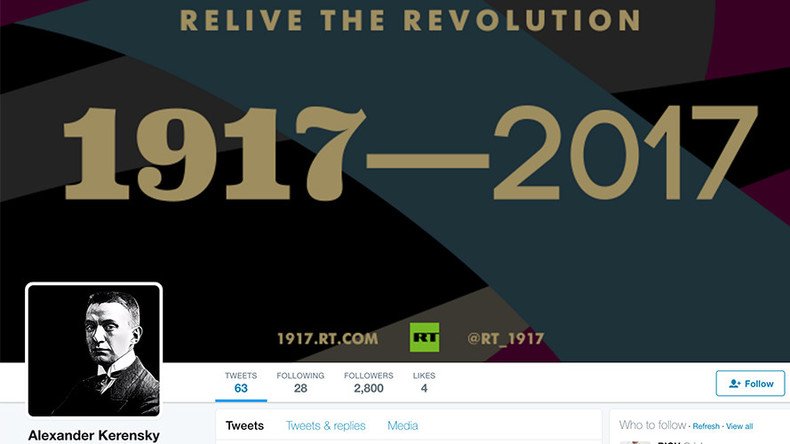#1917LIVE: War Minister Alexander Kerensky talks duty & freedom in Twitter Q&A

By June 1917, War Minister Alexander Kerensky has set revolutionary Russia on a fresh war path, trying to rally the troops and get the population on board as well. The Russian Telegraph sits down with the politician on the eve of a grand WWI offensive.
The Russian Telegraph (RT) is a fictional media outlet, part of the #1917LIVE project, which relives the events of the Russian Revolution through the eyes of its main actors and witnesses. The newspaper has just secured an interview with Kerensky upon his return from a tour of the front lines. The minister for war believes he has the full support of the troops, and that this is all he needs to force a newly-democratic Russia to fight in the World War until a “decisive victory.” But are his aspirations too unrealistic? Read on to find out.
On my way back to #Petrograd. Pleased to see that Crimea Peninsula and Black Sea Fleet are safe & situation there is under control #1917LIVEpic.twitter.com/9oFY5he4gw
— Alexander Kerensky (@Kerensky_1917) June 1, 2017
Already by mid-May it was clear to Kerensky that Russia’s majority working-class and peasant leanings, as well as this wounded sense of justice, could only be pacified by working together with the Soviets – workers and soldiers councils increasingly favoring Vladimir Lenin’s Bolshevik platform. Succeeding Minister for War Alexander Guchkov, Kerensky throughout May sets about striking a tentative balance between worker and peasant interests on the one hand, and the government’s foreign policy and commitments on the other. This while carefully trying to get a tired and anarchy-ridden army of 12 million people on board with fighting a war nobody had wanted by then. All of this is officially done in the name of keeping Russia’s promises to its Entente allies – France and Britain. The soldiers are told it’s in the name of defense against the Germans…
The revolutionary army is undoubtedly the freest military in the whole world! Our soldiers realize this no doubt #1917LIVE
— Alexander Kerensky (@Kerensky_1917) June 2, 2017
Kerensky returns from the front lines fully under the impression that he is successful in stirring up patriotic fervor among the fighting men – the same men he had earlier allowed to run wild by enacting Order No.1, a provision that practically frees every soldier’s hands to treat his superiors as equals. This swiftly upends troop discipline, playing into the hands of Lenin, who continues to fiercely campaign against the war and a government he claims is sustained by Anglo-French financing.
It is my unshakeable belief that free citizens of a free country will fight to protect Motherland no matter the cost #1917LIVE
— Alexander Kerensky (@Kerensky_1917) June 2, 2017
Kerensky staunchly denies that troop morale is low. The war minister is in part empowered by the warm reception he gets in the field, all but neglecting what is happening right under his nose.
I mean that free citizens of a free country will fight to protect Motherland! What you say is nothing but slander and libel #1917LIVE
— Alexander Kerensky (@Kerensky_1917) June 1, 2017
Kerensky, who never served in the army, has on several occasions aligned himself with the soldiers, viewing himself as a participant of the revolution. For this reason, the mixed bag of statements appears to emphasize both the importance of personal liberties and making the ultimate sacrifice – giving up one’s life for the ‘Motherland.’
Warriors of the #Revolution! You must be proud to protect Russia that guarantees ultimate freedoms never seen before in history! #1917LIVE
— Alexander Kerensky (@Kerensky_1917) June 2, 2017
Many of his contemporaries – those who have actually served in the military – have been warning him of the incongruity of mixing liberal leanings with sacrifice at such a crucial time for the country. However, Kerensky’s stance in this regard appears unwavering, and he pays them no heed.
Instead, the war minister celebrates by planning the long-awaited offensive on the Eastern Front, scheduled for the first day of July. Few, however, believe in its success. Including the soldiers – who now almost overwhelmingly revere Vladimir Lenin and his political platform.
Nothing is certain, but let me remind you – the grand offensive was originally planned for early April. We didn't cancel anything #1917LIVE
— Alexander Kerensky (@Kerensky_1917) June 2, 2017
It would seem that Kerensky cannot backtrack, for it would disrupt the much-needed agreements Russia holds with allies, France in particular. While Lenin and the Soviets insist that war must be swiftly exited with no promise of annexations and contributions, Kerensky tries to put a patriotic, defensive spin on things for the soldiers benefit.
Not at all! In order to achieve campaign’s objectives we must respect treaties that signal our commitment to our existing allies #1917LIVE
— Alexander Kerensky (@Kerensky_1917) June 2, 2017
Stay with RT and #1917LIVE to find out just how the large-scale offensive will play out. Hint: it won’t end well for Kerensky…
READ MORE: Leon Trotsky urges world’s proletariat to unite against bourgeoisie in Twitter Q&A












